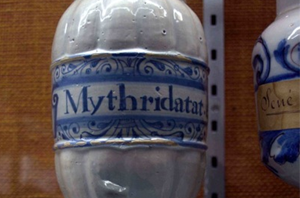Physician

Mentions in Pocketbook: August 1664
Four years after he returned from France, Lister confessed in a letter to John Ray, ‘in the days of my Vanitie . . . I chose rather to court Ladies than Nature’. However, while he was certainly courting women, Lister also courted Nature, evincing great interest in natural philosophy. These interests included the secrets of manufacturing processes, something to which the early Royal Society devoted many energies, intent on creating a vast encyclopedia of the trades. Later in his life, Lister would make detailed observations of mining operations reflecting his interests in metallurgy and chemistry. As a student, he was fascinated with another sort of manufacture—wax-making.
Wax-making was of perennial interest to natural philosophers in the Royal Society. In the late 1670s, even the philosopher John Locke was ordered by the Royal Society to “procure the history of the making of verdigris with wax”; like Lister, Locke made meticulous notes on artisanal processes practiced in the South of France such as wax making and preparing dyestuffs.

Lister wrote in his pocketbook about a sojourn to the home of Dr Joly to witness the process. Joly was described by Lister’s traveling companion, Sir Philip Skippon, as a ‘protestant and a very ingenious person, and civil to the English’. More than that, we do not know, as ‘Joly’ is as common a surname as ‘Smith’ is in English-speaking lands.
Dr. Joly was Huguenot. Montpellier had been a Huguenot stronghold during the Wars of Religion, and still had a significant, though declining, Protestant population. Out of an estimated population of 16,300 in 1610-1619, sixty percent were Huguenot; by 1661-65, numbers of Protestants had shrunk drastically, representing only thirty percent of a population of 21,400 in Montpellier 1.
The number of Protestants had been reduced by siege during the revolt of 1621-22 and by plague in Languedoc in 1629 2. With their reduction in numbers, came a reduction in their local power, though Huguenots, like Joly, still had some influence in the professions.
And, Joly was clearly delighted to host Protestant English students, showing them the local manufactures. Lister wrote in his pocketbook:
Dr. Joly wanted us at in his Vineyard where amongst \after/ other entertainments he was please to shew us what was very observable \in/ the vin lierie 3. adjoining, \where/ is a house for whittning of bees wax which is dark after this summer. They melt the Wax downe in a Caldrone. which they poure out into a deep Vessel which has on the one side of it is a long trough of water. in the vessel of wax they dipp certaine moldes of wood after the fashion of long-crowne hatt-blockes, having a \long/ handle \out/ of the broader end, but which he first well rubbed over with the shine of common shell-snailes. this hinders that the wax sti[c]kes not too the wood and is soe great a deffense against both the heat and cleaving Qualitie therof, that when you have \once/ rubbed your hand and nail with it, you may without feare dipp it in the hot molten wax and make your selfe an exact compleat glove. You must drawne out then coole it in the Trough of water and you have a Caste of Wax cones off the liknesse of parchement. The Castes thus wrough[t] they expose for many dayes to the Sun in up on \a/ flo[o]r paved with Square Tyl[e]. when they came to their whit[e]nesse they melt it together again.
Pocketbook, August 1664
Lister’s description of wax making in Montpellier is remarkably similar to that in Philip Skippon’s account, making one wonder if they witnessed the process at the same time.
Joly also had definite opinions about French and English medicine, telling Lister:
(since I purposed to make it my calling) he had observed in the practice of our English phisitians, that they healed too Excessively and that those of English Nations that came to Montpelier for cure, amongst other Symptoms had still some breaking \out/ or other, which he was go apt to beleve came from the violence of phisick taken in England.
Pocketbook, August 1664
Joly’s advice would have been a caution to Lister, as several of the chemical medicaments such as mercury for syphilis, or violent emetics prescribed to cure humoural imbalance, had debilitating side-effects. A popular remedy was also mithridatum, an expensive panacea and poison antidote from antiquity prepared by an elaborate and secretive procedure involving up to 65 ingredients. By the seventeenth century, it often included opium.
Back to top
- Philip Benedict, The Huguenot Population of France, 1600-1685: The Demographic Fate and Customs of a Religious Minority (Philadelphia: American Philosophical Society, 1991), Table 14, 55 ↩
- Benedict, The Huguenot Population, 3 ↩
- “In May and June, as staking was gradually completed and the vines were growing, there was also the lierie to be carried out, which was the attaching of the vines to the stakes. This was done using blanched rye straw, which was sold in bunches, known as glus which, for ease of use, were divided into torchettes that were kept damp in a cloth known as a pailleron; the torchettes, which were about 40 cm long, were passed through the vine-grower’s belt, who would then attach the vine to a stake by twisting two lengths of straw to make a sort of eyelet known as a marionnette”. See C. Moreau-Bérillon, In the Land of Champagne. The Vines. The Wine (Rheims, 1922) ↩
